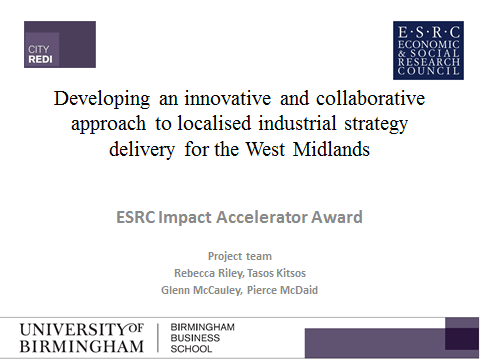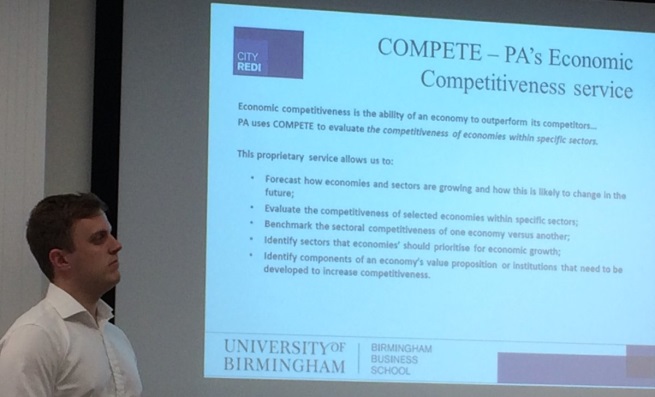 On October 18th City-REDI and PA Consulting hosted a workshop with key regional stakeholders on the progress of an ESRC-Impact Acceleration Account project to test the feasibility of applying PA Consulting’s COMPETE model at the subnational level. In this blog, Tasos Kitsos reports on the day and next steps.
On October 18th City-REDI and PA Consulting hosted a workshop with key regional stakeholders on the progress of an ESRC-Impact Acceleration Account project to test the feasibility of applying PA Consulting’s COMPETE model at the subnational level. In this blog, Tasos Kitsos reports on the day and next steps.
An informative and very productive workshop with some of the region’s key stakeholders.
This would be my one-line summary of the event. There were more questions raised than answered but thankfully, this was exactly the purpose of the workshop. With top level attendees from local and national institutions such as the West Midlands Combined Authority, Birmingham City Council, the Black Country Economic Intelligence Unit, the Knowledge Transfer Network, Birmingham Science City and the West Midlands Growth Company. Also, the Greater Birmingham Chamber of Commerce of course could not be missing. After all, next Wednesday we are launching together the Birmingham Economic Review. Last but of course not least, our own experts Professors Simon Collinson and Raquel Ortega-Argiles, as well as Dr Chloe Billing and Charlotte Hoole as well as Glenn McCauley and Pierce McDaid from PA Consulting.
 Starting from the top, Rebecca Riley has introduced the day discussing the challenges faced at the regional as well as national level. She stressed the need for an industrial strategy that will focus on place-based approaches which consider and enhance local assets.
Starting from the top, Rebecca Riley has introduced the day discussing the challenges faced at the regional as well as national level. She stressed the need for an industrial strategy that will focus on place-based approaches which consider and enhance local assets.
On her twitter account, I believe there is even a photo of how big a task she considers this to be!
Pierce McDaid continued by introducing PA’s COMPETE model and its application in different countries, assisting policymakers in exploiting the competitive advantages of their economy.
The model uses a range of indicators divided into themes and subthemes in order to account for different aspects of a place’s competitiveness.
This led us to my bit of the feasibility study which is looking into the practicalities of transferring COMPETE to the sub-national level. In short, the original indicators have been divided into those that straightforwardly can be used at the subnational level such as available qualifications in a place; those more complicated such as Foreign Direct Investment and their impact; those that are not expected to offer statistics with sub-national variation such as energy prices and; finally, what we termed “unicorn” indicators in the sense that everyone wants them but they are rather elusive such as process innovation or the quality of local institutions etc.
The most interesting part of the workshop though was the discussions we had in the room. These revolved both around strategic aspects such as identifying the exact questions we need to answer and what is the impact of this in the methodologies/indicators to be used and around how do you create these “unicorn” indicators in methodological as well as conceptual terms. In addition, emphasis was also given on the need to understand the difference between the performance of places or institutions and the perception of their performance which can often be different.
All in all, this was a very enjoyable workshop for us at CityREDI. It fulfilled its objective of creating more work and generated questions which we will be tackling in close partnership with our local and national partners.
From PA Consulting, Glenn McCauley commented that “A key aspect in developing a model that can be used regionally in the UK to measure the relative competitiveness of economies is to ensure that it meets the needs of key policy and decision makers. This workshop confirmed that there is a real need for such a tool and identified some clear and concise next steps for it to be developed.”
If you want to find out more about the project and be involved contact Tasos Kitsos at a.kitsos@bham.ac.uk.
To sign up to our blog mailing list, please click here.

